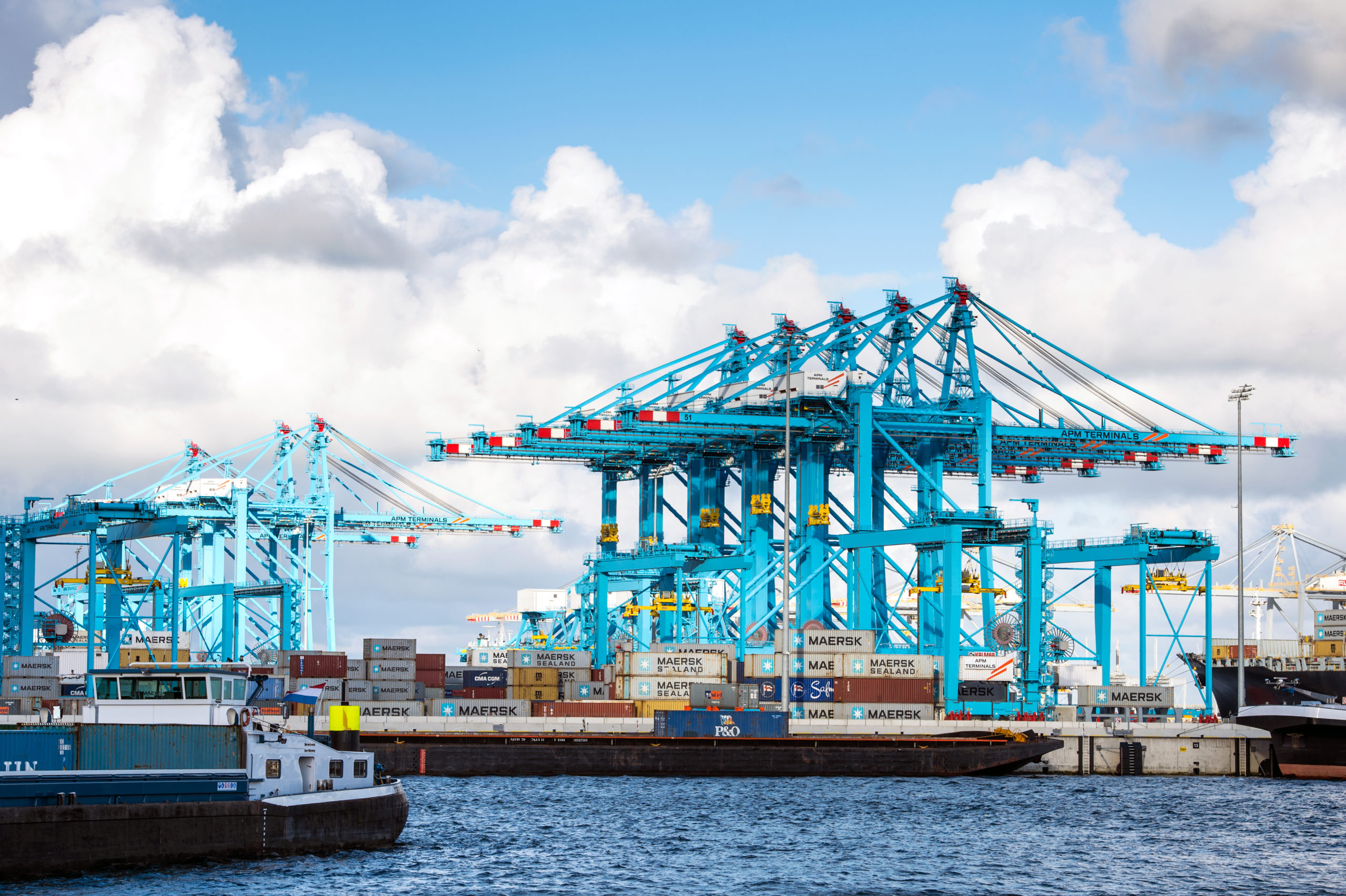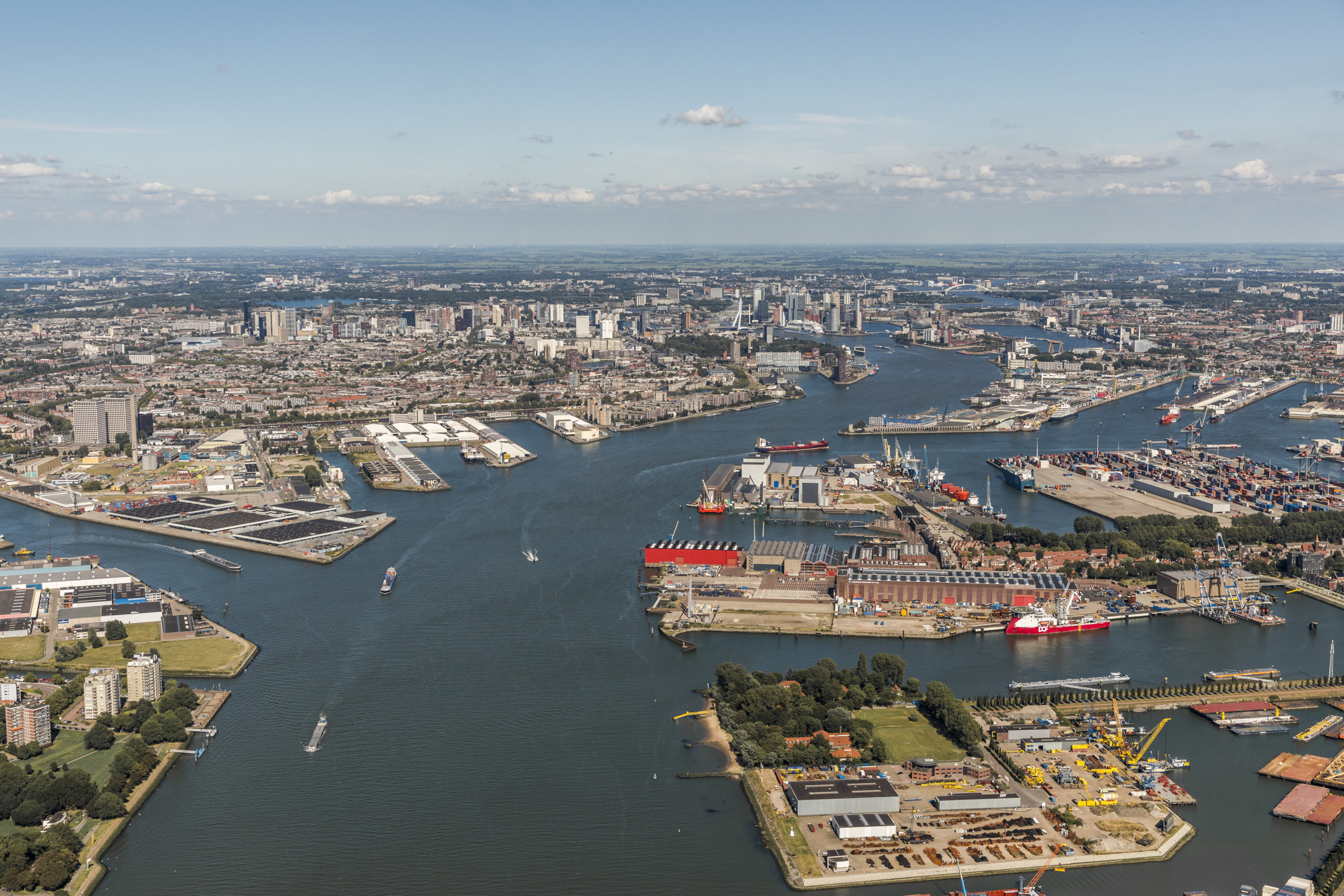Autonomous shipping is surely something that will only happen in the future? Rotterdam thinks differently. Autonomous shipping will lead to many great opportunities in the Rotterdam region: employment will increase, the area will become even more sustainable and the port will become safer. Rotterdam is getting to work: from allowing ships to navigate autonomously to adapting the ship’s surroundings accordingly.
Companies in the Rotterdam region are very active in the field of autonomous shipping. This is evident from the recent establishment of the Netherlands Forum Smart Shipping (NFSS), based in Rotterdam. Marco Scholtens, quartermaster of the NFSS and Innovation Manager of Netherlands Maritime Technology, explains how knowledge institutes, governments and industry partners have joined forces to implement smart shipping in the Netherlands from Rotterdam. Harmen van Dorsser, advisor on nautical innovations at the Harbour Master’s Division at the Port of Rotterdam Authority, is one of the driving forces behind the NFSS and gives his vision of autonomous shipping.
Autonomous shipping
There are several definitions for autonomous shipping. According to Scholtens, autonomous shipping refers to a vessel that operates safely without direct human control, both in terms of navigation and the monitoring of onboard systems. The NFSS sees autonomous shipping as highly automated navigation: involving automated ships, bridges that respond automatically to ships or automatic data exchange between ship and shore.
Distinctive Rotterdam
According to Scholtens, Rotterdam distinguishes itself from other maritime hubs in the world because the Rotterdam region harbours a complete maritime cluster with many different stakeholders concentrated together in a relatively small area. ‘The challenge of making autonomous shipping really work is to bring together every party needed for its development; the port, insurers, governments, industry, shippers, software programmers and tech developers. Rotterdam is succeeding in this.’
Van Dorsser: ‘Rotterdam has everything to become a frontrunner in the field of autonomous shipping. The Port of Rotterdam is working hard on digitalising the port. ‘Rotterdam is distinctive in its big-picture thinking. By digitalising the traffic picture in the port, Rotterdam is making a vital contribution to the most difficult aspect of autonomous shipping: navigating in busy, heavily trafficked areas and making decisions about this. For example, by digitalising a mooring bollard in such a way that it can eventually inform the ship itself about its status. But also digitalising dynamic information such as weather models, wind models and water flow models. Creating a predictive character of the port’s traffic picture makes it easier for autonomous ships to navigate there.’

The NFSS
The NFSS was launched on 21 September. It continues to build on the objectives of SMASH!, which was initiated by the Ministry of Infrastructure and Water Management in 2017. It is an initiative from the Nederland Maritiem Land (Maritime by Holland), TKI Maritiem, TKI Dinalog, Ministry of Infrastructure and Water Management, Netherlands Maritime Technology, the Royal Association of Netherlands Shipowners (KVNR), Expertise and Innovation Centre for Inland Navigation, City of Rotterdam, Port of Rotterdam, Port of Amsterdam, Groningen SeaPorts, Maritime Delta, Innovation Quarter, TU Delft and MARIN.
The forum aims to make the Netherlands a leading country in the field of smart shipping. This requires specialised knowledge, economic advantage and the adaptation of rules and regulations. The NFSS brings governments, companies and knowledge institutions together in its own meeting place. The ambition is to get one or more large collaborative projects off the ground in the field of autonomous shipping. ‘I strongly believe in the power of demonstration projects. For example, by building an autonomous ship and letting it navigate and then resolving any problems that are subsequently discovered.’ If the NFSS can get at least one or two such projects funded before the end of next year, Scholtens will be extremely satisfied. The NFSS is busy organising new smash up meetings that will continue to take place digitally for the time being. These are thematic lectures on, for example, Artificial Intelligence (AI) and regulations. ‘We also want to organise another matchmaking event this year where, for example, a shipbuilder who wants a test platform for autonomous navigation systems, can look for a software developer to collaborate with.’
Opportunities
Autonomous shipping leads to many opportunities in terms of employment, sustainability and safety, explains Scholtens. ‘A lot of work will be transferred from ship to shore. Each job that is lost due to automation will be replaced by two jobs elsewhere.’ The shore-based maritime ecosystem will benefit in particular: operation centres for autonomously operating ships, IT companies providing autonomous services and logistics service providers.
Greater sustainability is also a consequence of autonomous shipping. Scholtens: ‘When a logistics operation is carried out more efficiently, fuel savings are automatically made and thus emissions are reduced. For example, an autonomous ship can be programmed so that it sails precisely fast enough to ensure it doesn’t arrive too early or too late. A ship with little or no crew can be built smaller, which is also more economical than a large ship. In addition, autonomous ships ensure that there is less traffic congestion on the roads and therefore less emissions are released. Ships are typically more energy-efficient than road and rail transport.’
Scholtens: ‘Autonomous systems are expected to provide a higher degree of safety. Eighty per cent of maritime accidents are largely due to human error. A computer does not get tired or drunk and makes fewer mistakes in the dark. Software problems, on the other hand, can still cause problems. All in all, autonomous shipping leads to considerably safer business operations. For example, an autonomous navigator looking over the captain’s shoulder and sounding an alarm when the ship may be about to hit something. That will help enormously in improving the safety of ships.’

Network of Initiatives
A lot is happening in the Rotterdam region in the field of autonomous shipping. Shipping Technology is a company that collects data to develop self-navigating ships. Scholtens: ‘Shipping Technology has developed a system that records everything that happens on an inland vessel: speed, rudder position, weather conditions, camera and radar images and all the sensors.’ The aim is to let the ship sail the way the captain sails. Shipping Technology was one of the first companies to receive permission from the Ministry of Infrastructure and Water Management to test autonomous systems throughout the Netherlands. ‘Because the Port of Rotterdam is also working on this, they have moved their offices to Rotterdam. Collaboration is far better when you’re closer to each other.’
Research studies in autonomous shipping have also been carried out by the Delft University of Technology, the Erasmus University Rotterdam and the Rotterdam University of Applied Sciences.
Rotterdam based company, Captain AI, focuses on the development of software for safe autonomous navigation. At the Floating Lab, experiments are being undertaken on autonomous sailing using a former patrol vessel (RPA3) of the Port of Rotterdam. The vessel is equipped with cameras, sensors and measuring equipment. By making this data available to the business community and educational establishments, further research can be done into autonomous shipping and the Port of Rotterdam can further prepare for its arrival.
The Researchlab Autonomous Shipping in Delft is testing and researching autonomous shipping applications. The high-end technology supplier based in Delft, Demcon, recently delivered an autonomous drone to Rotterdam’s Van Moort. Scholtens: ‘An important aim of the NFSS is to scale up initiatives that are already taking place and to promote mutual collaborations.’
Novimove
The Port of Rotterdam is also participating in the Novimove research programme. This is a European innovation project which was launched in June. It explores innovations in inland shipping transport, of which automation plays a major role. The 21 partners from six countries, which include the TU Delft and MARIN, will work together over the next four years to improve transport on the Rhine corridor between Basel and the seaports of Rotterdam and Antwerp. An example of such an improvement is smart navigation by combining information from satellites with real-time information on water levels.”,
Related brand partners
Media library for this story
No items found